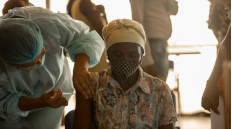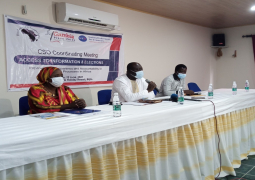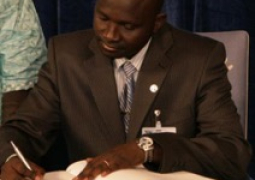
Those vaccinated include the elderly, health workers, security forces, journalists, teachers and students among others.
Women passengers have not also been left out in this vaccination exercise with most of them taking the vaccine to protect themselves, their families and the public from the pandemic, which has left millions of people dead since its outbreak in December 2019.
Fatou Sarr, a native of Nema Alkali, who took the vaccine some time ago, said: “Prior to being vaccinated I had to avoid coming in contact with people. I had to walk daily to and from the market. I had to also allow my husband to drop off our children to school and pick them up when they close. But after taking the vaccine I feel confident and comfortable to join commercial transport any time. I assure everyone, particular women, that the vaccines are safe and therefore encourage them to get vaccinated for their safety and that of their families.”
Amie Njie, a native of Tallinding, also explains: “I am an entrepreneur and move around a lot to supply customers with goods. I knew that it was risky to come in contact with people without being vaccinated. As such I got vaccinated to protect myself and customers as well as ensure my business do not collapse as a result of the pandemic.”
According to her, she did not experience any side effects after taking the vaccine.
Fatou Jallow, a native of Bakoteh, said she took the vaccine to protect herself, fellow students, teachers, family and the society.
“I had to take the vaccine to ensure I stay healthy to be able to continue my education and I did not regret being vaccinated because since I took it I have not experienced any signs or symptoms of Covid-19 and I am able to go about my education and other errands.”
Mariama Manneh, a civil servant, indicated that she was one of the non-essential workers laid off during the peak of the Covid-19.
“Prior to resuming work, I ensured I took the vaccine to protect myself and colleagues at work.”
She says she now feels safe joining commercial vehicles and mingling with colleagues on a daily basis after taking the vaccine.
For Aminata Kanteh, she was somehow skeptical about the vaccine at first but after President Barrow took it she knew it was safe and therefore she also got vaccinated.
The first case of Covid-19 was reported on December 31, 2019 and the source of the outbreak is linked to a wet market in Wuhan (Hubei province, China). The Gambia’s Ministry of Health confirmed the country’s first case of corona virus on Tuesday March 17, 2020.
As a precautionary measure, Gambian President Adama Barrow on the same day announced that all schools, including universities, should be closed from Wednesday 18 March 2020 for 21 days. Additionally, all public gatherings, including open markets were suspended immediately for three weeks. All overseas travels by public officials were also cancelled to prevent further spread of the virus.
As of 30 October 2022, The Gambia officially registered 372 Covid-19-related deaths and 12,580 positive cases.
This story was produced with support from Journalists for Human Rights (JHR), through its Mobilising Media partner Kaba Communications in the Fight Against COVID-19 in partnership with The Point.





